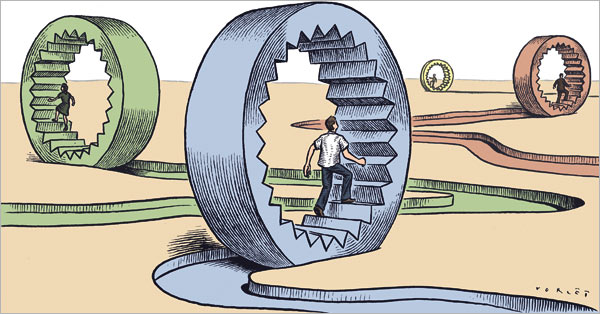Sareeka Tewari
How often we think about our life seriously rather how often we observe our life ?

If we analyse our life we will find that we are just the creatures of our habits.
Select a person randomly and observe his or her daily pattern during the week. Generally He or she gets up in the morning, takes a shower, eats something, goes to work, completes the assignments at work, comes home, has dinner, watches TV or spends time on the computer for a while and then goes to bed. The weekends are set aside for shopping and social activities including travel.
This cycle continues with some minor variations depending on seasonal activities and other details. Of course, the routine changes occasionally in a more substantial way when there is a life-changing event such as marriage, birth of a child, new job, etc., but we re-establish a new routine quickly. We feel very comfortable with such a routine. We get stressed out when events happen randomly or unpredictably outside our routine.
Observation: Life is all about Periodicity
We human beings are “creatures of habits”. When we lose our jobs through retirement or lay-off or lose our spouses through death or divorce, we often lament by saying “I miss my job” or “I miss my wife”. What we really miss is the routine we developed around our job or spouse. The key to feel stable and comfortable again is to develop a new routine without the job or spouse. Some people are even afraid to retire because they do not want to break their routine.
The routine arises from the need to earn money to provide for food, housing, clothes and other necessities of life and need for companionship which leads to marriage and family.

Interspersed between all such activities are our thought processes which involve all kinds of emotions. Whenever we are not doing anything physically, we are thinking and feeling some of these emotions. Thinking is often required by our jobs as well, but at other times we are simply thinking, perhaps incoherently about all aspects of our life: our wish to purchase something, our analysis of some event, romantic thoughts about a person of the opposite sex, an urge to create something, worry about our children, some weekend plan and so on. In fact, we think even while we are doing some physical activities.
It seems that life is nothing but a periodic repetition of activities immersed in a sea of thoughts and emotions. The same description of life can even be applied to people who live unconventional lives – monks, panhandlers, prisoners locked up for life, astronauts in a long-term mission on a spaceship; they all follow a certain routine. Even if one is confined to an enclosed space where there is no interaction with the outside world, one’s “biological clock” kicks in and one follows a routine.
When we think about life we realise that most of the things we do in life revolve around earning money and enjoying the fruits of our labor. However, I would like to note that all the needs we satisfy with money – the need for food, clothes and shelter and other amenities and even physical needs – is really to follow the requirements of our bodies. If our body did not change at all and retained a fixed shape without food then this whole concept of education, jobs, marriage etc. for sake of catering to the needs of our bodies becomes irrelevant.
However, we will still be active. We may still want to go to school to broaden our knowledge base. We may still want to work, to not only keep ourselves busy, but to test if we can correctly apply knowledge learned from books. We may still want to take on a mate just for companionship. Most significantly, we would still develop a daily routine and have a life. My point is that life is not about earning money to sustain our body, building wealth or raising children; it is simply a repetitive set of activities and it does not matter what those activities are.
Let us now examine why this is the case. The fact that the earth spins around its own axis at a rate of one revolution in 24 hours and gives rise to day and night automatically introduces a fundamental periodicity in how we spend our life. There is an additional periodicity with a period of one year because the earth revolves around the sun within a period of one year. This also gives rise to the concept of seasons. In addition, we also introduced a weekly periodicity in our life simply by dividing a year into fifty-two weeks.
However, I can argue that unlike a day or a year, there is nothing fundamental about the duration of week, such as its correlation with positions of stars and planets. In fact, a week, as we know it, consists of seven days; different cultures have experimented with different durations of a week, anywhere from four days to ten days.
The period is fundamentally determined by the motion of the planets i.e. a 24-hour period, modulated by seasonal and annual variations. Can there be life anywhere without periodicity? Interestingly enough, each planet spins around its own axis as well as revolving around other stars. Otherwise, they would have been attracted by some other mass and be destroyed in the resulting collision. So, even if there is life on some other planet, it is logical to conclude that “life” on that planet also follows a periodic routine based on its rotational motions.
The routine is generated in one of two ways: firstly by ourselves, using our thoughts and emotions Secondly by dictated to us by some plan which does not involve our input . A routine with a periodicity which is determined by some plan or thought process gives life a structure.
If we intentionally make our life completely random or, at least, non-periodic, say by eating and sleeping at irregular hours and doing completely different physical activities on different days, it is likely that our body would not be able to sustain it and at some point, break down. Our body and its biological clock are probably synchronised to the rotation of earth in some way because the evolution of the body from sperm to embryo to a fully mature baby takes place on a spinning platform.
The bottom line is that our life has a periodicity and it is related to the (rotational) motion of earth and presumably indirectly to the motions of other planets and stars as well. A logical question at this point would be if the cyclic nature of joy and sorrow in our lives is also related to such motions as well, thus lending credence to the subject of astrology.
What do you say???



